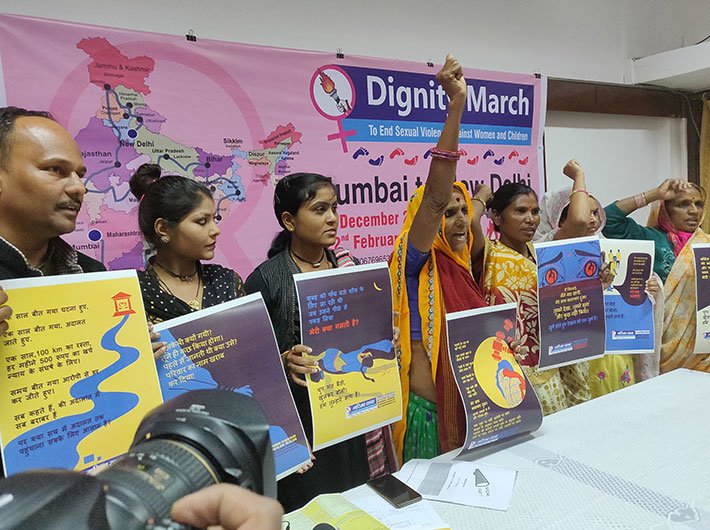The 65-day-long march will cover 200 districts across 24 states/union territories across the nation. It will culminate in Delhi on February 22
Around 5,000 survivors of sexual violence along with their family members from across the country have embarked on a 10,000 kms Dignity March from Mumbai. The 65-day-long march will cover 200 districts across 24 states/union territories across the nation. It will culminate in Delhi on February 22.
The march aims to end victim shaming of women and children of sexual violence, shift humiliation on the perpetrators and create a non- judgmental and safe environment for the victims.
Organised by Rashtriya Garima Abhiyan, the march will create a network of survivors and ensure their participation in policy-making and implementation of laws and guidelines for crimes related to sexual violence.
Among others, survivor and activist, Bhanwari Devi, Urmila Devi and custodial gang-rape survivor, Janki Bai, were also present at the campaign’s event in Mumbai.
The findings of an online survey were also released at the event. According to the survey, Speak Out!, 74 percent of the respondents said that they have faced sexual violence in their lifetime. Out of the 1,150 respondents who confirmed sexual violence, 92 percent are women, and 8 percent are men. 78 percent respondents said that the incidents happened when the survivor was a minor.
In terms of types of sexual violence, 31 percent of respondents said that they have been raped; 4 percent gang-raped; 4 percent faced an attempt to rape; 21 percent were inappropriately touched; 22 percent were stared at; 3 percent were forced to oral sex; 2 percent were forced to watch pornography; 2 percent faced sexual comments/slurs/songs; 2 percent were followed or stalked; 2 percent faced flashing /inappropriate bodily gesture; and 1 percent faced voyeurism. 28 percent of the respondents said that the incidents happened inside the homes of survivors and 18 percent said they had been abused in a deserted space.
In 64 percent cases, the abuser was known to the victim. 62 percent survivors did not inform about the incident to anyone. 95 percent survivors did not file any complaint due to social stigma and 47 percent felt shame as the reason for not reporting
28 percent of the respondents belong to scheduled caste; 22 percent to scheduled tribes; 33 percent to other backward castes and 14 percent to general caste. Whereas, 1 percent belong to religious minority and 2 percent to other category.
Narrating her ordeal, Mamta Tanwar, mother of two, said that she used to work as a cook in Ujjain, Madhya Pradesh. A family acquaintance promised her a better job in Susner, about 100 miles away. She was tricked and taken to a brick and mortar room in an open field instead. She was held captive there and was raped by four men for two days. When she tried to run away, she was brutally beaten. After five days her perpetrators took her thumb impression on a blank paper and sold her to another man for Rs 2 lakh in Lala Khedi village. Mamta narrated her ordeal to the village sarpanch, but he turned a deaf ear. She was later rescued by a person from the same village. He left her in Indore. From there she went to Ujjain but her family had moved out. When she went to the police to file her complaint, the officials refused to register her complaint and said that she is making false allegations. For a while she took refuge at the Ujjain railway station. Slowly she started doing some tailoring work and now she lives alone in a rented room.

